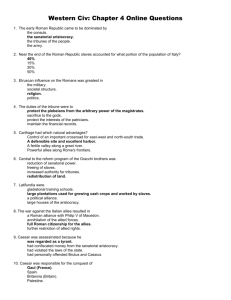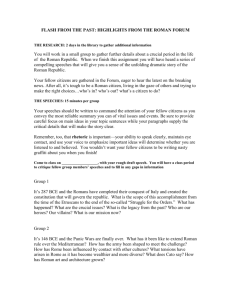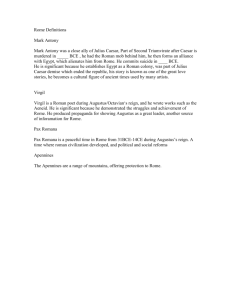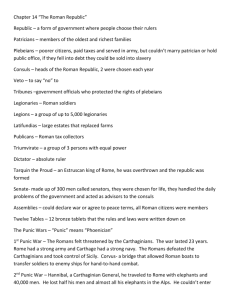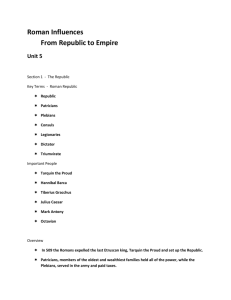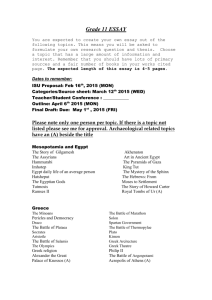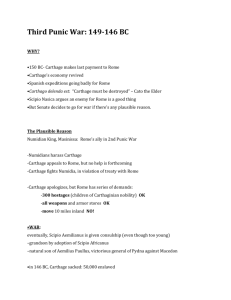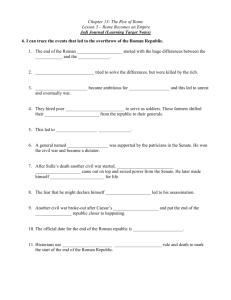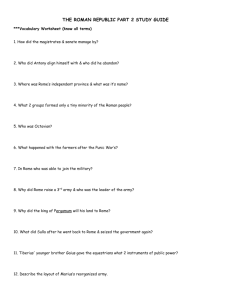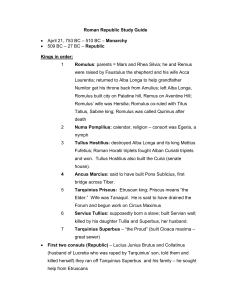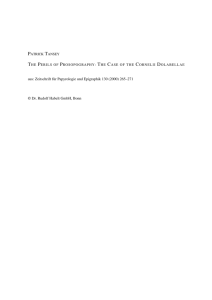Lecture Outlines
advertisement
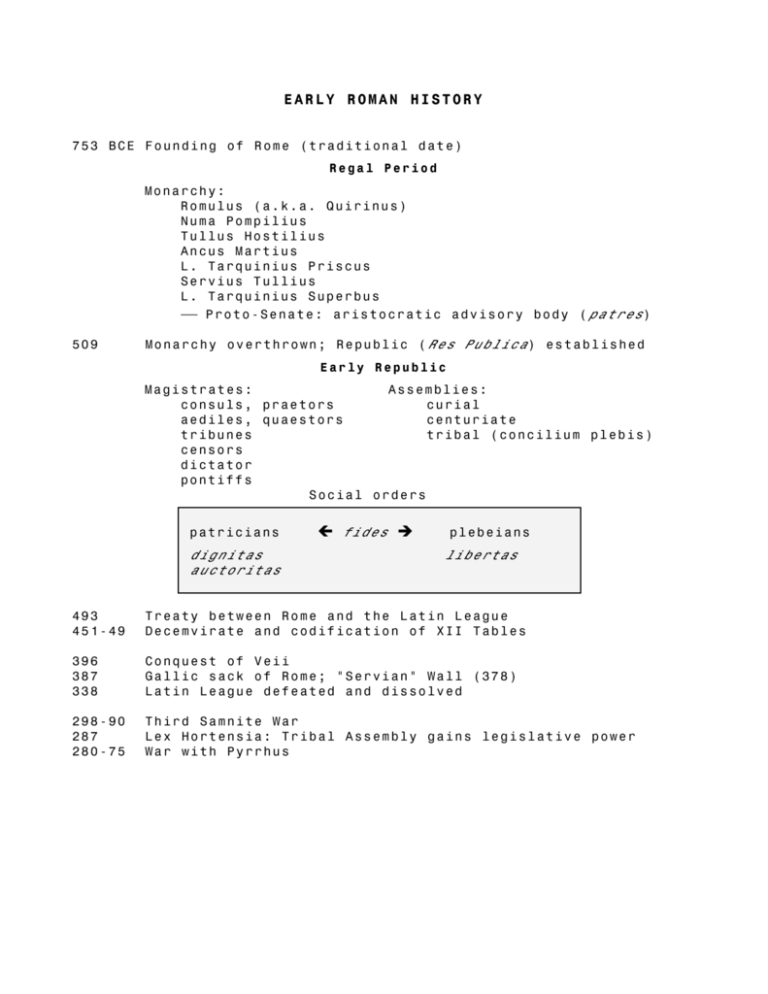
EARLY ROMAN HISTORY 753 BCE Founding of Rome (traditional date) Regal Period Monarchy: Romulus (a.k.a. Quirinus) Numa Pompilius Tullus Hostilius Ancus Martius L. Tarquinius Priscus Servius Tullius L. Tarquinius Superbus Proto-Senate: aristocratic advisory body (patres) 509 Monarchy overthrown; Republic (Res Publica) established Early Republic Magistrates: Assemblies: consuls, praetors curial aediles, quaestors centuriate tribunes tribal (concilium plebis) censors dictator pontiffs Social orders patricians dignitas auctoritas Í fides Î plebeians libertas 493 451-49 Treaty between Rome and the Latin League Decemvirate and codification of XII Tables 396 387 338 Conquest of Veii Gallic sack of Rome; "Servian" Wall (378) Latin League defeated and dissolved 298-90 287 280-75 Third Samnite War Lex Hortensia: Tribal Assembly gains legislative power War with Pyrrhus MIDDLE REPUBLIC (3rd cent. BCE) 264-41 First Punic War: Results: Carthage loses Sicily (then Corsica and Sardinia) Carthage pays 3,200-talents over 10 years Reasons for Roman victory: tenacity / leadership / manpower / naval tactics 226 221 219 The "Ebro Treaty" Hannibal given Carthaginian command in Spain Fall of Saguntum 218-01 Second Punic War: 218 217 Hannibal crosses Alps; Battle at Trebia River Battle of Lake Trasimene Q. Fabius Maximus Cunctator appointed dictator 216 Battle of Cannae; defection of allies 215 Philip V allies with Hannibal 213-11 Syracuse and Capua reduced M. Claudius Marcellus; Archimedes 210 P. Cornelius Scipio appointed proconsul in Spain 209 New Carthage falls; Tarentum falls 207 Hasdrubal defeated at the Metaurus River 205 Roman treaty with Philip V 204 Scipio invades Africa 203 Hannibal crosses to Africa 202 Battle of Zama 201 Carthage capitulates Results: Carthage surrenders all but African holdings Carthaginian fleet reduced to ten triremes Carthage pays 10,000-talents over 50 years Rome acquires Spain Reasons for Roman victory: senatorial leadership and firmness loyalty of allies in central Italy P. Cornelius Scipio Africanus MIDDLE REPUBLIC (2nd cent. BCE) 200-196 197 Second Macedonian War Battle of Cynoscephalae T. Quinctius Flamininus announces Greek freedom ØØØØØØØØØØ 192-189 189 War with Antiochus III Roman victory at Magnesia ØØØØØØØØØØ 172-167 168 167 Third Macedonian War L. Aemilius Paullus defeats Perseus at Pydna Tributum discontinued for Roman citizens Macedon and Illyria divided into protectorates 1,000 Achaeans deported to Rome ØØØØØØØØØØ 149-146 Third Punic War ("Delenda est Karthago") Scipio Aemilianus Macedon becomes a Roman province Destruction of Carthage; Sack of Corinth ØØØØØØØØØØ 148 146 143-133 133 Numantine war in Spain Fall of Numantia LATE REPUBLIC (133-31 BCE) Optimates vs. Populares 133 77-71 74-63 73-71 70 66-62 63 60 59 58-49 55 54 53 Tribunate of Tiberius Gracchus Pergamum willed to Rome by Attalus III Tribunates of Gaius Gracchus War with Jugurtha Marius consul (i) Marius consul (ii-vi) Teutones and Cimbri defeated Social War First Mithridatic War; Marius consul (vii, d. 86) Sulla dictator (82-81)reign of terror; Sulla consul (80), retires (79); Pompey in Sicily and Africa Pompey in Spain Third Mithridatic War Spartacus Revolt Pompey and Crassus consuls; trial of Verres Pompey's commands against pirates and in the East Cicero consul; conspiracy of Catiline First Triumvirate: Julius Caesar, Pompey, Crassus Julius Caesar consul; Pompey marries Julia Julius Caesar in Gaul Pompey and Crassus consuls Death of Julia Battle of Carrhae 49-44 49 48 44 Civil War, Phase I Crossing the Rubicon Battle of Pharsalus Julius Caesar assassinated 44-31 43 42 31 Civil War, Phase II Second Triumvirate: Octavian, Antony, Lepidus Battle of Philippi Battle of Actium 30 27 Suicide of Antony and Cleopatra Imperator Caesar Augustus 123-122 111-105 107 104-100 102-101 90-88 89-85 82-79 IMPERATOR CAESAR AVGVSTVS tribunicia potestas / imperium proconsulare / pontifex maximus Art and Architecture Forum Augustum (Mars Ultor, 37-2 BCE) Ara Pacis (13-9 BCE) Primaporta statue Mausoleum (Res Gestae Divi Augusti) Clipeus Virtutis Religion and Ethics Temple repair Priesthoods (Augustales) Ruler Cult (Divus Julius) Moral edicts Secular Games Public Works and Games [Agrippa] Aqueducts, baths, Cloaca Maxima XIV Regiones Ludi Theater of Marcellus (13 BCE) Coins "Divi Filius" "Pax" "Aegypto Capta" "Signis Receptis" "Pater Patriae" "Cl(ipeus) V(irtutis)" Literature [Maecenas] Vergil, Aeneid Horace, Odes Livy, History Dole Grain Money "TARGET GROUPS" | Senatorial Class: 600 families Equestrian Class: ca. 5000 families Lower Classes: urban poor; peasantry Provincials Future Ages?? THE FIRST CENTURY CE Major Trends: increasing autocracy waning of authority of senate and magistrates growth of professional civil service (freedmen) prominence of Equites in government increased influence of the Praetorian Guard frontiers established provinces and client-states organized emergence of armies as emperor-makers Julio-Claudians Augustus, 27 BCE-14 CE; Tiberius, 14-37; Gaius (Caligula), 37-41; Claudius, 41-54; Nero, 54-68 9 Teutoburg Forest disaster c. 30 Crucifixion of Jesus 43 Invasion/annexation of southern Britain 64 Great Fire at Rome 66-70 Jewish rebellion 68-69 "Year of the Four Emperors" Flavians Vespasian, 69-79; Titus, 79-81; Domitian, 81-96 70 Destruction of Jerusalem; Fall of Masada (73) 79 Eruption of Mt. Vesuvius 80 Colosseum (Flavian Amphitheater) dedicated LATIN LITERATURE Pre-"Golden Age": 2nd-cent. BCE Plautus Terence [Polybius Lucilius Comedies (e.g., Menaechmi, The Pot of Gold) Comedies (e.g., Phormio, The Brothers) Histories] Satires "Golden Age" Phase I: Late Republic, 1st-cent. BCE a) Speeches (e.g., Against Verres, Against Catiline, For Caelius) b) Essays on oratory c) Philosophical essays (e.g., On Friendship, On Old Age) d) Letters Lucretius De Rerum Natura ("On the Nature of Things") Caesar War commentaries Catullus Lyric poetry (esp. "Lesbia" cycle) Cicero "Golden Age" Phase II: Augustan Era Horace Vergil Livy Ovid Satires and lyric poems (esp. Odes) Eclogues, Georgics, Aeneid History Metamorphoses, love poetry/erotic manuals "Silver Age": 1st/2nd-cent. CE Petronius Satyricon Seneca (Stoic) philosophical essays and letters; tragedies Pliny Letters Tacitus Annals, Histories Suetonius Lives of Caesars, et al. Juvenal Satires Further reading: Frank O. Copley, Latin Literature (Ann Arbor 1969). Moses Hadas, Ancilla to Classical Reading (New York 1954). Gilbert Highet, Poets in a Landscape (New York 1957). R.M. Ogilvie, Roman Literature and Society (Harmondsworth 1980). THE 2ND AND 3RD CENTURIES CE 96 Era of the "Five Good Emperors": Nerva, Trajan, Hadrian, Antoninus Pius, Marcus Aurelius succession by adoption consolidation of borders and border-defenses barbarian incursions atrophy of senate and magistracies disease and manpower shortage decline in civic service (liturgies) financial strains 180 180 Transition: Commodus / the Severan Dynasty: Septimius Severus succession problems rise of the soldier-emperor citizenship granted empire-wide (212) honestiores v. humiliores debasement of currency 235 235 Chaos and Near Disintegration: Anarchy at the Center: The "Barracks Emperors" armies out of control; rival claimants barbarian incursions (Alemanni, Franks, Goths) central districts under pressure reassertion of Persian power (Sassanid dynasty) Shapur I captures Emperor Valerian (260) Aurelian (270-275) restores some stability over-taxation to meet defense expenses increased settlement and recruitment of barbarians religious disputes (Decius, 249-51) 284 284 305 Order through Quasi-Totalitarianism: Diocletian the Tetrarchy (Augusti & Caesares) distribution of power/burdens; succession problem solved outright autocracy ("Oriental" pomp) overgrowth of bureaucracy: provincial subdivision Edict on Maximum Prices the "Great Persecution" (303-311) CHRISTIANITY AND THE ROMAN EMPIRE c.30 64 Crucifixion of Jesus [cf. ARD 406-408] The Great Fire at Rome [ARD 408-409] grounds: c.95 c.110 177 a) b) c) d) e) f) public order? collegia? atheism? treason? criminality/immorality? [ARD 412-13] name alone? Persecution of Christians by Domitian Pliny in Bithynia [ARD 409-411] Persecution at Lyons [ARD 415-416] 249-51 Persecution of Christians by Decius 303 Diocletian and Galerius begin "Great Persecution" 311 Edict of Toleration [ARD 416] 312-37 Career of Constantine: a) Battle of the Mulvian Bridge (312) b) Edict of Milan (313) c) Constantine sole emperor (324-37) d) Constantinople founded (324), inaugurated (330) e) Council of Nicaea (325) 360-63 Julian the Apostate 379-95 Career of Theodosius I a) influence of St. Ambrose b) Symmachus/Altar of Victory (382-4) [ARD 389-91] c) paganism outlawed (391) Reasons for the success of Christianity: a) b) c) d) e) it it it it it had support of the emperor (starting with Constantine) was exclusive was egalitarian* offered rewards satisfied the need to belong *Colossians 3:11, "There is no question here of Greek and Jew, circumcised and uncircumcised, barbarian, Scythian, slave and freeman; but Christ is all, and is in all." DECLINE AND FALL 324-337 379-395 410 476 Constantine Theodosius I: split between East and West Alaric and Visigoths sack Rome Last western emperor deposed Reasons for decline and fall 1) moral fiber a) religion b) civic irresponsibility c) the military d) race e) "barbarization" 2) demography a) disease b) agriculture c) celibacy d) toxin 3) bureaucracy 4) economics: inflation, over-taxation, etc. 5) technology 6) chance Symptoms of decline (Edward Gibbon via Alistair Cooke): 1) 2) 3) 4) 5) a mounting love of show and luxury an obsession with sex a widening gap between the very rich and the very poor a general desire to live off the state a developing numbness to vulgarity, violence, and the assault on the simplest human decencies 6) the folly of exercising military might in places remote from the centers of power 7) freakishness in the arts masquerading as originality 8) enthusiasm pretending to be creativity
